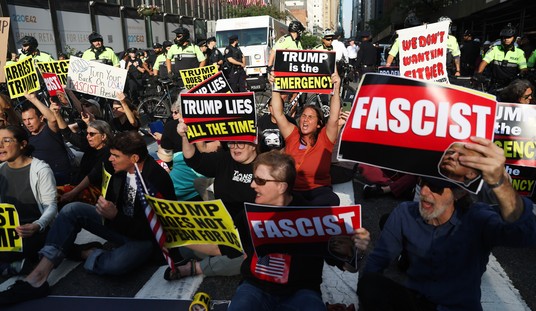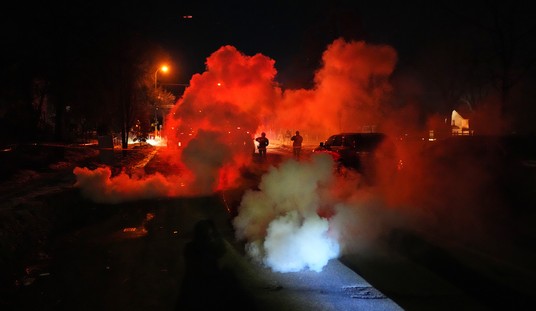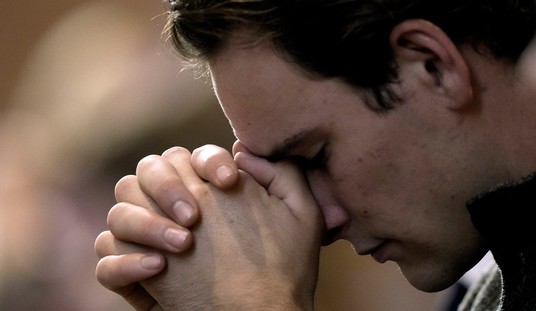About a week ago, I wrote an article about rhetoric vs. reality with respect to the Blue Lives Matter movement. The basic thrust of the article was that, in spite of the claims of the police and their defenders, violence against police is not on the rise in America – in fact, it is at the lowest point it’s ever been. The statistics don’t lie: we are on pace in America for the second lowest number of police deaths due to firearms in the last 50 years. Yet, if you paid attention to the nation’s op-eds for the first week of September, you would get the erroneous impression that violence against police is worse than it ever has been, rather than better.
The article didn’t get a lot of attention (as I suspected it wouldn’t), but I felt like it was important to write in order to combat the next logical wave of op-eds, which we are now seeing: op-eds from ostensibly conservative writers excusing the police for going on a working strike in response to this allegedly pervasive wave of anti-cop crime. A pretty good example of this oeuvre is this piece in the WSJ titled “America’s Legal Order Begins to Fray.” Observe how police are wholly excused from going on, essentially, a working strike in America:
After two decades of the most remarkable crime drop in U.S. history, law enforcement has come to this: “I’m deliberately not getting involved in things I would have in the 1990s and 2000s,” an emergency-services officer in New York City tells me. “I won’t get out of my car for a reasonable-suspicion stop; I will if there’s a violent felony committed in my presence.”
A virulent antipolice campaign over the past year—initially fueled by a since-discredited narrative about a police shooting in Ferguson, Mo.—has made police officers reluctant to do their jobs. The Black Lives Matter movement proclaims that the police are a lethal threat to blacks and that the criminal-justice system is pervaded by racial bias. The media amplify that message on an almost daily basis. Officers now worry about becoming the latest racist cop of the week, losing their job or being indicted if a good-faith encounter with a suspect goes awry or is merely distorted by an incomplete cellphone video.
With police so discouraged, violent crime has surged in at least 35 American cities this year. The alarming murder increase prompted an emergency meeting of the Major Cities Chiefs Association last month. Homicides were up 76% in Milwaukee, 60% in St. Louis, and 56% in Baltimore through mid-August, compared with the same period in 2014; murder was up 47% in Minneapolis and 36% in Houston through mid-July.
Let’s unpack this a little bit. In the first place, the side that prides itself on arguing based on the facts rather than emotions has a troubling willingness to discard facts when writing these sort of “violence against police” think pieces. I’ve read probably two dozen of them over the last couple weeks and less than five have noted that the total police deaths due to firearms so far this year is 24 – and of those, none have looked at the data to determine whether that number is low or high according to historical trends.
This omission is not excusable through incomplete or conflicting data. Unlike data about deaths caused by police (which is fragmented, incomplete, and subject to vigorous debate), deaths of police officers are carefully catalogued by Federal agencies and are not the subject of reasonable dispute. The data is likewise very easy to find in about 30 seconds or less using Google. Which is exactly how I was able to determine the true facts about violence against police, which are damning to the “poor us” attitude on display here:
There’s one major problem with this rhetoric: it’s flatly untrue. There have been 24 police officers killed by attacks in the line of duty this year. This means that we are on pace for a total of 35 such deaths this year – which would represent the second lowest total ever, only slightly more than the all time low of 32 in 2013. Overall, policemen are still more likely to be killed in a traffic accident (due to the appallingly low rate at which police officers wear seat belts) than they are by firearms or any other kind of attack. And police attacks have continued to trend steadily downwards other than a small spike last year[.]
To put this into perspective, in 1973 the U.S. population was 65% of what it currently is (and the number of per capita police was roughly the same), but the number of police death due to firearms was roughly 500% of what it currently is.
What this means is, not only is it not worse than it’s ever been, it’s actually better than it’s ever been. Much better. While the number of traffic and “other” related deaths has remained relatively consistent, the number of firearm related deaths has gone way, way down. If you are a police officer, you are almost ten times less likely to get killed by firearms fire today than you were in the 1970s.
So, what police are responding to here is not an actual surge in violence directed at cops, it’s a surge in scrutiny of their activities. And police actually feel comfortable stating, on the record, that this surge of scrutiny justifies them in their refusal to do their jobs. This op ed in the WSJ even states as much – it’s not that the police fear being attacked, it’s that they fear being monitored:
Officers now worry about becoming the latest racist cop of the week, losing their job or being indicted if a good-faith encounter with a suspect goes awry or is merely distorted by an incomplete cellphone video.
Here is a useful thought experiment: imagine if the government employees described in this story were teachers, rather than cops. How would that change our perspective on what is set forth, as conservatives? Imagine that teachers were objecting to the fact that they were increasingly being monitored, criticized, and videotaped, and that as a result of that, they felt like they couldn’t actually do their job of teaching (but of course, they felt compelled to actually show up to work and continue to collect a paycheck!). What level of sympathy would we have?
I would guess, probably not much.
But when it comes to our equally unionized police force which takes the same public stance that all their members are right under all circumstances, we give them a pass. When the NYPD Benevolent Association defended the cop with multiple excessive force complaints who was caught on tape slamming James Blake to the ground without so much as a word of warning and then buffoonishly attempting to cover up the entire thing, almost no one on the right made what I would consider to be a fairly obvious observation: “Good Lord, these people are just as bad as teachers’ unions.”
And of course, no article of this type would be complete without passing along police complaints about being recorded uncritically:
A New York cop in the Bronx tells me that he was trying to extricate a woman pinned under an overturned car in July when a bystander stuck his cellphone camera into the officer’s face, trying to bait him into an argument. “You can’t tell me what to do,” the bystander replied when asked to move to the sidewalk, the cop reports. “A few years ago, I would have taken police action,” he says. “Now I know it won’t end well for me or the police department.”
Given the numerous incidents we have covered here in which officers unlawfully ordered citizens to cease recording their activities even when the recording occurred at a safe distance, or took clear retaliatory action against citizens who had the temerity to record them, I strongly doubt that the bystander in question had her cell phone camera in the “officer’s face,” at least as any ordinary person would interpret a cell phone camera being “in their face.” To a cop, a cell phone camera being “in their face” generally means “within range to clearly capture what is occurring.”
Quite frankly, the fact that police don’t feel comfortable using “police action” to make people stop recording their activities is a feature, not a bug.
Likewise, every such article must mention the since-discredited “hands up, don’t shoot” narrative out of Ferguson – without mention of the fact that, since Ferguson, police have likewise faked attacks against police to drum up sympathy for their cause:
(CNN)A part-time Massachusetts police officer lied when he said somebody shot at his patrol car, causing it to crash and catch fire, a police sergeant said Thursday.
“We have determined that the officer’s story was fabricated,” said Mills, Massachusetts, police Sgt. William Dwyer. “Specifically that he fired shots at his own cruiser as part of a plan to concoct a story that he was fired upon.”
If the entire justice reform movement is discredited because the friends of Michael Brown made up a story, why is this story summarily ignored?
The reality is that both sides of this debate have become completely unmoored from actual facts and data and have resorted to petulant argument over whose narrative is more compelling. That’s, I guess, largely how politics goes in this country, but it’s distressing to see conservatives so uncritically accepting an excuse from public sector employees about how they deserve to continue receiving their paychecks but should be excused from actually performing their job duties.
Perhaps in the middle of this unthinking cavalcade of “Black Lives Matter has caused increased inner city crime” pieces, we could at least have an occasional headline that reads “Police refusal to do their jobs has caused inner city crime.”














Join the conversation as a VIP Member